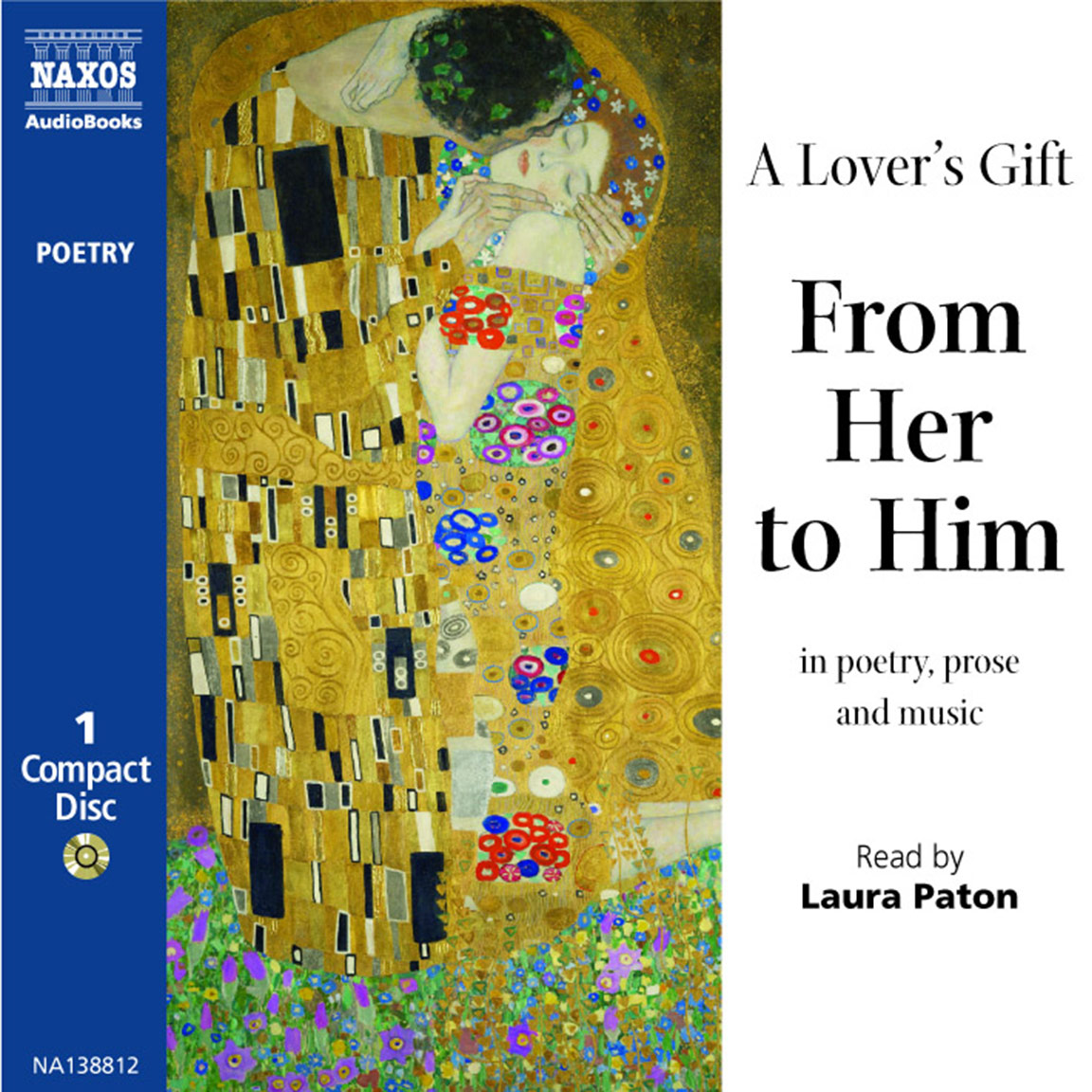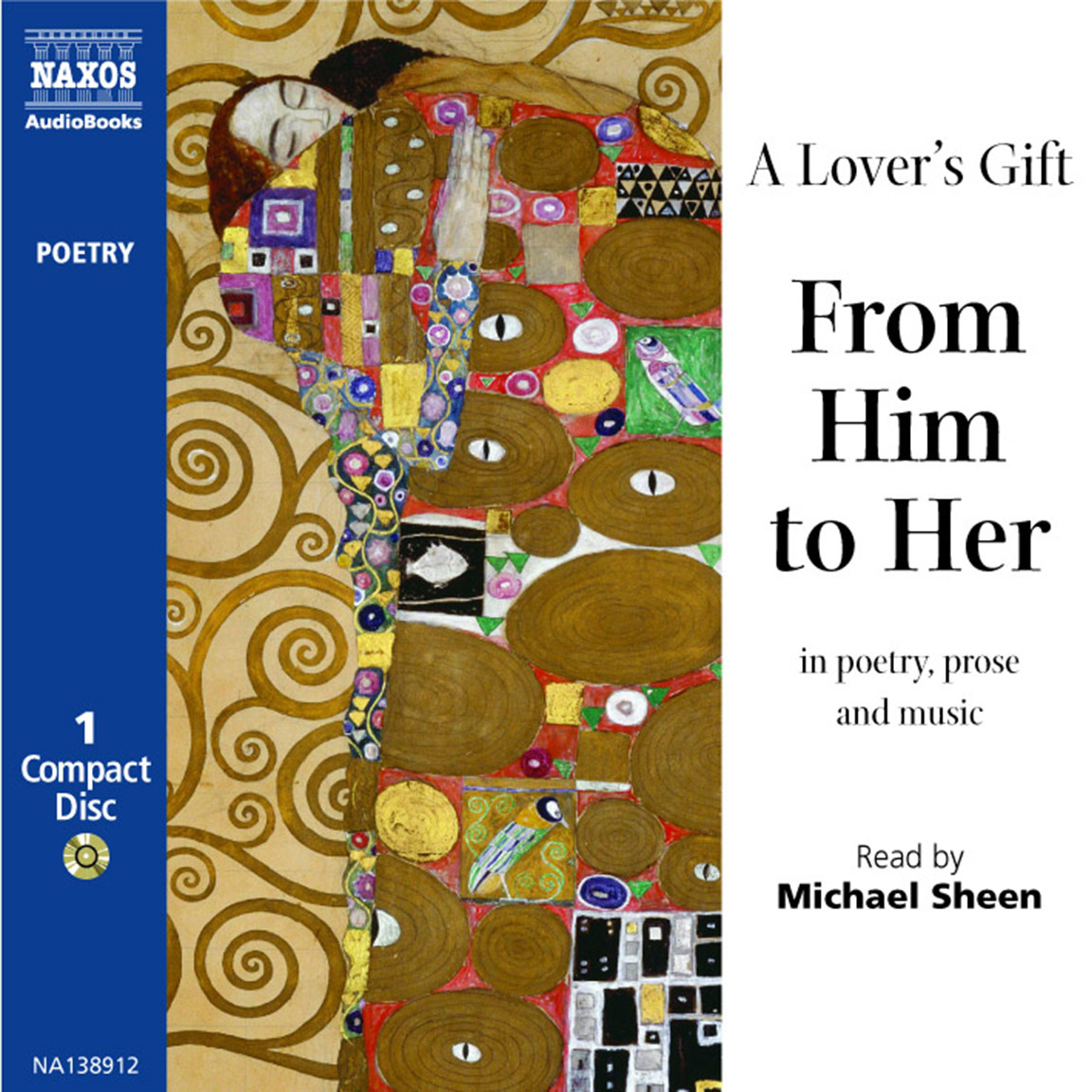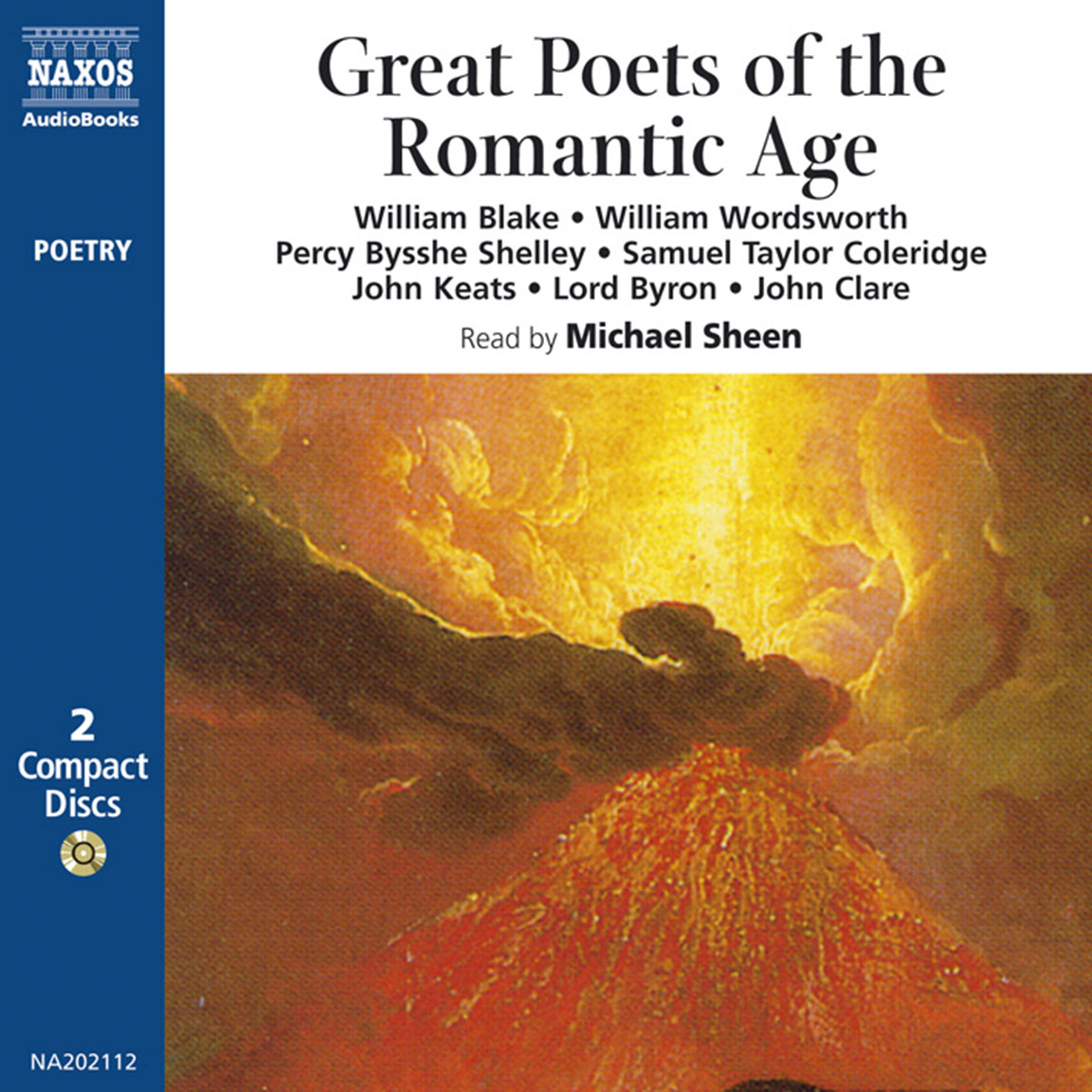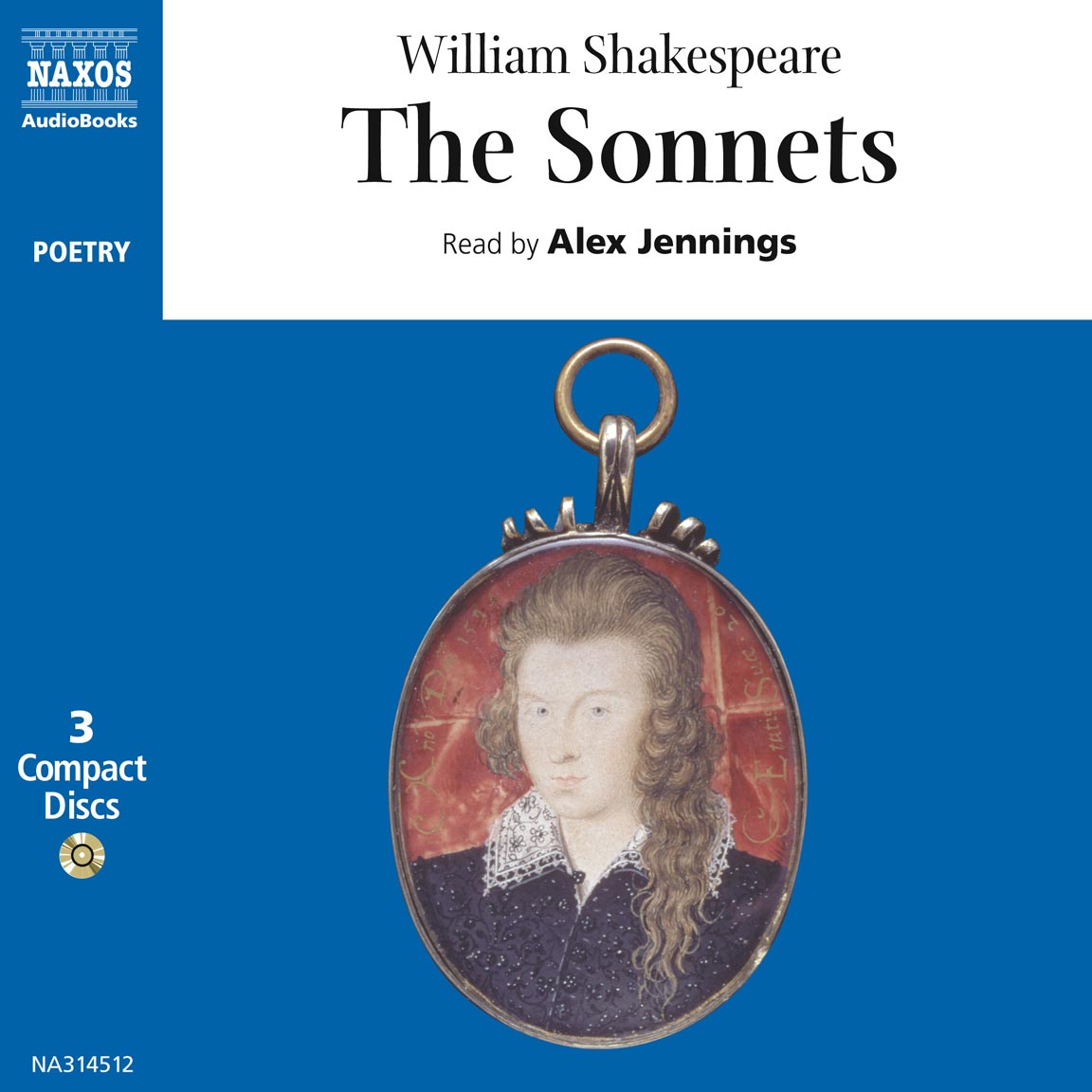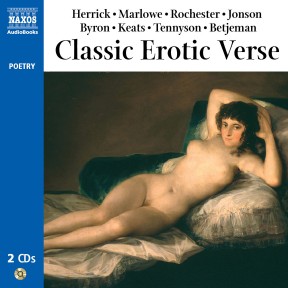
Audio Sample
Classic Erotic Verse
Read by Edward de Souza, Matthew Marsh, Stella Gonet, David Timson & Benjamin Soames
selections
A witty, bawdy, erotic but classic collection of poetry designed to celebrate the most sensual of human pleasures. Over the ages many poets have put pen to paper in celebration of that most raw and yet most beautiful of human instincts – erotic love. This anthology includes verse by Herrick, Marlowe, Jonson, Byron, Verlaine, Whitman, Yeats, Cummings and, from our own time, John Betjeman. All aspects of erotic love are to be found in these poems – from the bawdy to the sensuous and tender.
-
Running Time: 2 h 38 m
More product details
Digital ISBN: 978-962-954-831-5 Cat. no.: NA293812 Download size: 38 MB BISAC: POE023020 Released: January 2009 -
Listen to this title at Audible.com↗Buy on CD at Downpour.com↗Listen to this title at the Naxos Spoken Word Library↗
Due to copyright, this title is not currently available in your region.
You May Also Enjoy
Included in this title
- Anonymous
- Green rushes with red shoots
- Bhartrhari
- If the forest of her hair
- Christopher Marlowe
- Either she was foul
- Lord Byron
- Don Juan
- John Wilmot, Earl of Rochester
- Ancient person of my heart
- John Keats
- The Eve of St Agnes (excerpt)
- Anonymous
- She lay all naked
- Liu Yung
- Before lowering the perfumed curtain
- D H Lawrence
- New Year’s Eve
- John Donne
- The Flea
- Robert Herrick
- I abhor the slimie kisse
- Richard Brinsley Sheridan
- The Geranium
- Aphra Behn
- The Willing Mistress
- Hafiz
- Ode 44
- Sir Thomas Wyatt
- My lut awake
- Sir Francis Kyanston
- On Cynthia’s Embrace
- John Wilmot, Earl of Rochester
- Naked she lay
- Amaru
- When his mouth faced my mouth
- Anonymous
- Madrigal
- Robert Herrick
- The Vine
- Thomas Nash
- The Choice of Valentines
- Robert Graves
- Down, Wanton, Down
- Anonymous
- The Four and Twentieth Day of May
- Robert Herrick
- Upon the Nipple’s of Julia’s Breast
- Vidyapati
- Style of the new moon
- Thomas Randolph
- The Milkmaid’s Epithalamium
- Aphra Behn
- To the Fair Clorinda
- Vidyapati
- Twin Hills
- Charles Baudelaire
- Imagine the magic
- Hafiz
- Ode 173
- Bhartrhari
- Three Poems
- John Betjeman
- A Subaltan’s Love Son
- John Donne
- To His Mistress Going to Bed
- William Wordsworth
- The Glow Worm
- E E Cummings
- May I feel said he
- Robert Herrick
- A sweet disorder in the dress
- William Cartwright
- Tell me no more
- Liu Hsalo-Wei
- For my wife
- Alfred Lord Tennyson
- Now sleeps the crimson petal
- Thomas Carew
- On the Marriage of TK and CC
- D H Lawrence
- Figs
- Algernon Charles Swinburne
- In the Orchard
- Robert Herrick
- To Julia’s Petticoat
- Robert Browning
- Now
- Walt Whitman
- From pent-up aching rivers
- John Dryden
- The Posture
- Alfred Lord Tennyson
- Mariana
- Algenon Charles Swinburne
- Before Parting
- Ts’ao Chih
- A beautiful woman
- William Blake
- The Sick Rose
- W B Yeats
- A Last Confession
- Ben Jonson
- Doing, a filthy pleasure is
- Sharon Olds
- The Connoisseuse of Slugs
- Sir Thomas Wyatt
- They flee from me
- John Betjeman
- Late-Flowering Lust
- Anonymous
- Nizam
- Walt Whitman
- A Glimpse
- Paul Verlaine
- Thousands and Three
- Walt Whitman
- The Beautiful Swimmer
- Arthur Rimbaud
- My mouth is often joined against his mouth
- Marie Madeleine
- Foiled Sleep
- Christina Rossetti
- Laura and Lizzie Asleep
- Samuel Taylor Coleridge
- Christabel and Geraldine
- Emily Dickinson
- Wild Nights, Wild Nights
- Pierre de Louys
- Penumbra from Chansons de Bilitis
- Christopher Marlowe
- Hero and Leander
- Sir Charles Sedley
- On the Happy Corydon and Phyllis
- Francis Beaumont
- Salmacis and Hermaphroditus (excerpt)
- W B Yeats
- Leda and the Swan
- W B Yeats
- Leda and the Swan
Reviews
Rummaging through my poetry collection for something vaguely Valentine-related – Burns, Sonnets from the Portuguese, even Classic FM’S 100 Favourite Love Poems – I came across this. Be warned: soppy hearts and pretty flowers it most definitely isn’t, even if some of your favourite garden-centre poets are here – Wordsworth, for instance, and Herrick, who elsewhere lamented, “Fair daffodils, we weep to see / You haste away so soon”. He’s less preoccupied with horticultural matters here, viz: “I abhor the slimy kiss / Which to me most loathsome is. / Those lips please me which are placed / Close, but not too strictly laced; / Yielding I would have them, yet / Not a wimbling tongue admit. / What should poking-sticks make there, / When the ruff is set elsewhere?” The title poem is by John Wilmot, Earl of Rochester, infamous 17th-century bisexual libertine whose X-certificate verses leave little if anything to the imagination. The same goes for Stella Gonet’s passionate – no, let’s not mince words, pornographic – reading of Swinburne’s “In the Orchard”. And prurient to boot, because the lovers writhing in the moonlight are clearly male. “Nay, slay me now; nay, for I will be slain; / Pluck thy red pleasure from the teeth of pain . . . Slay me ere day can slay desire again; / Ah God, ah God, that day should be so soon.” Erotic doesn’t have to be hot and sweaty. Heaven forbid that anyone should mention sweat and Emily Dickinson, belle of Amherst, in the same breath, but something surely must have loosened just a little, a hairpin, a button, as she wrote “Wild nights! Wild nights! / Were I with thee, / Wild nights should be / Our luxury! // Futile the winds / To a heart in a port, / Done with the compass, / Done with the chart. // Rowing in Eden! / Ah! the sea! / Might I but moor / Tonight in thee.” With contributions from Hafez, Baudelaire, Tsao Chih, Whitman etc, you get a feel for what turns lovers from other cultures on. Long hair does it for Persians, knitting for Chinese. My favourite is “The Connoisseuse of Slugs” by Sharon Olds, which disgusted me first time round – I hate creepy crawlies – but now makes me laugh out loud. She’s right – erotic doesn’t have to mean serious, either. Sex can be hilarious, especially when you’re comparing naked men becoming aroused to the little knobs popping out at the top of a slug’s antennae: “The slow / elegant being coming out of hiding and / gleaming in the dark air, eager and so / trusting you could weep.” Bravo, Ms Olds.
Sue Arnold, The Guardian
Booklet Notes
It is natural that poets should write about erotic love. The erotic urge is amongst the most raw and primeval of human impulses and it would be odd indeed if it were ignored in literature. Rather, the intensity of that emotion, and that of the whole creative process, make this a natural subject for writers.
Erotic love, or lust, differs from other kinds of love in that it possesses a certain degree of physicality – in very early Egyptian and Sumerian literature it is perceived as a sickness. This anthology of classic erotic verse is a celebration of this most irrational yet irrepressible of emotions.
Of course, the word love (derived from the Sanskrit lubh – to desire) has come to denote a variety of meanings in our language. As so often, the Greeks had a word for it – three in fact – but it was eros which indicated sexual love.
As in all literary genres, poetry reflects the time and society in which it is composed. This is perhaps particularly apparent in literature which concerns itself with matters of love, and especially sexual love.
The well-documented Victorian period stands as an obvious example of repression (though often accompanied by hypocrisy) and represents one extreme on the scale of tolerance. The sexual revolution of the 1960s and the liberation it heralded (in matters sexual, as well as self-expression) typifies the other. Thus, nineteenth century prudery can give rise to a slightly amusing use of metaphor which may not always be immediately apparent.
On the other hand, the sixteenth and seventeenth centuries produce literature which is far more forthright while often retaining great beauty of language and form – and a seductive tenor. Rochester, for example, is a particularly good example of the sexual freedom and bawdiness which came to symbolise the Restoration.
This collection draws mainly on poetry from the English language though French literature is also represented with poems by Baudelaire, Verlaine and Rimbaud. There is a rich sensuous tradition in the East as well, and we have poems from the Chinese, Sanskrit and Arabic.
By its very nature the poetry of erotic love – perhaps as opposed to romantic love – is introspective and selfish in that it is generally written by the poet for him- or her-self. It has been suggested that true eroticism – the wisp of a veil, the sheen on the skin, the curve of a thigh – is largely a private affair; when it becomes public, it moves into the area of the bawdy. In spite of this there is a thread that runs through much of this verse which is derived from the commonality and passion of human emotion.
This collection has been structured in three ages and, inevitably, there are more poems written from a youthful perspective than from a maturer point of view. Clearly, this does not mean that these poets were young when they wrote these lines, but rather indicates the ideal of young love.
I have included poems which are homosexual in nature, as to omit this area of literature would be to gloss over some of the important and tender erotic verse known to us. And our society no longer demands such censorship.
I have also included several poems which deal with eroticism in mythology. The two Elizabethan poems (by Marlowe and Beaumont) are both heavily influenced by Ovid although they also contain much from their own time and both contain comic as well as erotic elements. I am grateful to David Timson for his suggestions which add greatly to this collection – these he reads himself in this recording.
Notes by Anthony Anderson
